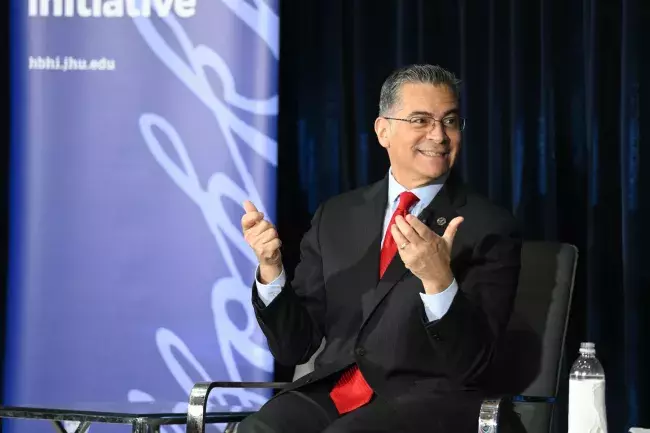A Hopkins Business of Health Initiative Earth Day event highlighted the critical need for sustainability in the health care sector. The initiative is paving the way for a future where health care is environmentally sustainable and economically thriving.

Does sustainable health care start with reusable products?
Article Highlights
- HHS Secretary Becerra urged the health care sector, which accounts for 8.5% of U.S. greenhouse gas emissions, to adopt sustainable practices to avoid future costs and demonstrate climate leadership.
- The HBHI Earth Day event brought together experts from business, public health, medicine, and nursing to address health care sustainability challenges.
- Panelists discussed engaging frontline staff, standardizing sustainability metrics, leveraging digital health technologies, and preparing future leaders to drive change.
- The Carey Business School is committed to collaborating across disciplines to develop innovative solutions that improve care quality and planetary health.
With the health care sector accounting for 8.5% of U.S. greenhouse gas emissions, U.S. Health and Human Services Secretary Xavier Becerra brought a particularly pointed message to a broader, high-impact conversation on Earth Day around how to make the business of health more sustainable.
Hosted at the Johns Hopkins University Bloomberg Center in Washington, D.C., by the Hopkins Business of Health Initiative in collaboration with the Johns Hopkins Carey Business School, Bloomberg School of Public Health, and the Johns Hopkins Schools of Nursing and of Medicine, respectively, the event brought experts in health care delivery together for an eye-opening overview of just how much waste the industry might be able to mitigate.
“The largest power plant in the nation”
In a one-on-one conversation with moderator and HBHI Journalist-in-Residence Joanne Kenen, Becerra deemed enduring climate leadership "the most important thing" for the U.S. to demonstrate after political decisions undermined its credibility abroad. By decarbonizing high-emissions health care, "we can use our technology, our energy, to show the rest of the world...when you jump in that water, you'll be able to swim."
Across the U.S., health care delivery requires single-use, often non-recyclable materials, all of which end up either incinerated or heaped into landfills. According to research published in the AMA Journal of Ethics in late 2022, hospital patients produce nearly 34 pounds of plastic waste each day. Becerra declared that America's hospital systems and medical providers are collectively "the largest power plant in the nation."
"At some point, if they continue to be close to 10% of the problem, they're going to start paying 10% of the price," he cautioned.
However, curtailing those future costs will require significant upfront investments amid daunting financial constraints. The secretary portrayed a global race, with developing nations hoping to leapfrog to renewable energy if America can prove the sustainability business case.
The secretary wasn’t afraid to bring a personal element to his sense of urgency, borne of his background and the impact of environmental factors on ill health in minority populations like those in Sacramento, California, where he was born and raised.
“A lot of the folks I grew up with are dying a little bit sooner than others,” said the first Latino in U.S. history to hold his cabinet post.
Perspective from practice
"When we talk about the business of health, we are not just talking about ROI, margins, and profitability,” Carey Business School Dean Alex Triantis told attendees. “We are talking holistically about the intersection of business and health, even beyond the health sector. Today's theme is indicative of how deep the issues are, that we care not only about customers but also about our employees and our communities as well. It is fabulous that we are able—on Earth Day—to focus deep into this issue."
Following Becerra’s fireside chat, Triantis introduced the panel of experts, which included women’s health Nurse Practitioner Deanna Benner, William H. Welch Professor of Medicine and History of Medicine at Johns Hopkins Jeremy Greene, MD, and Yale School of Medicine Associate Professor of Anesthesiology and Epidemiology Jodi Sherman, MD.
Benner, co-chair of ChristianaCare's Environmental Sustainability Caregiver Committee, emphasized the importance of engaging frontline staff in sustainability initiatives, discussing its cost-benefit analysis and the potential for sustainable business models in women's health. Dr. Greene provided the historical context for the shift toward disposable medical supplies and the notion that single-use, disposable items are better for patient safety. For example, a laryngoscope—the device that goes into the mouth to help insert a breathing tube—has become a disposable item, but restaurants can wash silverware and reuse it. Dr. Sherman highlighted the need for standardized sustainability metrics and the potential for international collaboration to drive market changes.
What to Read Next

business of health
Emerging technologies and greater equity to shape the future of healthPanelists agreed on the need for a collaborative approach to reducing health care’s carbon footprint to achieve significant progress that involves policymakers, providers, and the community. They discussed upcoming trends such as the increased use of digital health technologies that reduce the need for physical resources and the potential for big data to optimize energy-efficient practices in health care settings. They also emphasized the role of business schools, like the Carey Business School, in preparing future leaders to tackle sustainability challenges and drive global change.
As the event concluded, Bloomberg Distinguished Professor and HBHI Director Dan Polsky reiterated the Carey Business School's commitment to working across disciplines to address the health care sector's complex challenges.
"By bringing together experts from business, public health, medicine, and nursing," he said, "we can develop innovative solutions that improve both the quality of care and the health of our planet."


